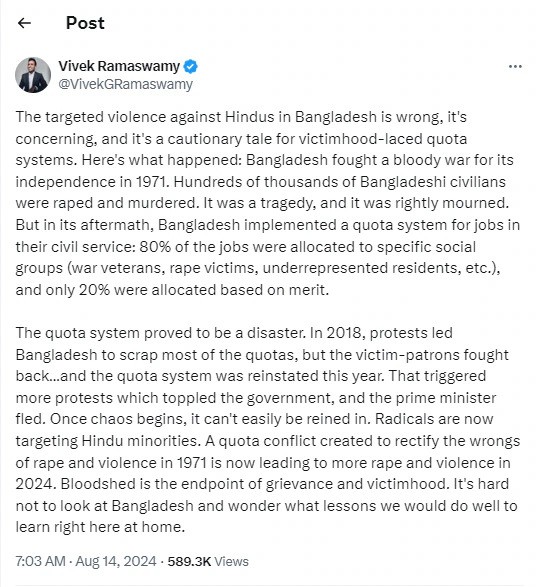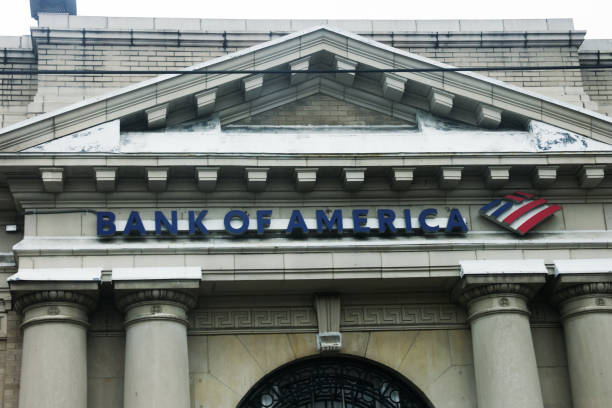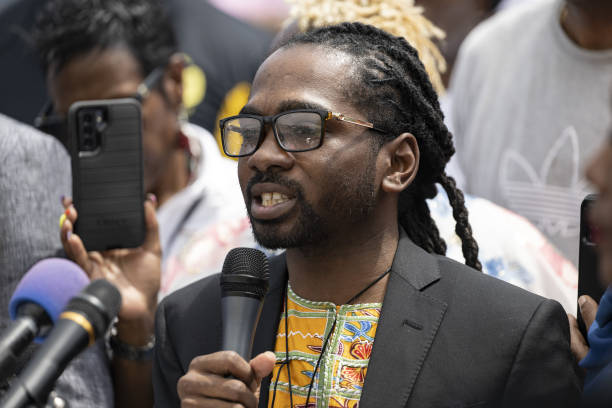Vivek Ramaswamy criticizes attacks on Hindus:
Vivek Ramaswamy, a past Republican nominee for president has spoken out against the specific violence against Hindus in Bangladesh criticizing the country’s quota systems that are based on victimhood.
Vivek Ramaswamy a previous Republican candidate for president, has criticized the specific violence towards Hindus during the turmoil in Bangladesh and criticized the country’s quota systems that are full of victimhood.
In a lengthy post on X, the entrepreneur detailed the quota demonstrations in Bangladesh emphasizing that violence is the inevitable result of grievances and feeling like a victim.
The 39 year old who dropped out of the White House race and supported Donald Trump in January, explained on the microblogging site how the implementation of a quota system meant to address the “injustices of rape and violence” during the 1971 War of Independence has resulted in an increase of such incidents in 2024.
He tweeted that the targeted violence against Hindus in Bangladesh is unjust, troubling and serves as a warning about victim focused quota systems.

Bangladesh struggled in a violent conflict for its freedom in 1971. Rape and murder were committed against hundreds of thousands of Bangladeshi civilians. Ramaswamy’s tweet stated that it was a tragedy and it was mourned appropriately.
Discussing the quota systems that sparked protests in Bangladesh in June, the Republican commented that despite being deemed a failure and largely removed in 2018 by the previous Sheikh Hasina administration, the “beneficiaries of the scheme pushed back and successfully reinstated it in the current year”.
Once chaos starts, it is difficult to control. Radicals are currently focusing on Hindu minority groups. A conflict over quotas established in 1971 to address issues of rape and violence is now causing an increase in rape and violence in 2024. “Bloodshed is the result of resentment and feeling like a victim,” he posted on Twitter.
Vivek Ramaswamy concluded his tweet by mentioning the US and pondering the potential “lessons” Americans could take from the Bangladesh crisis.
The post said that when looking at Bangladesh, it’s difficult to not think about what lessons we could benefit from learning in our own country.
The extensive protests in Bangladesh, resulting in the deaths of a minimum of 500 individuals, began as marches against the quota system in public sector employment. Later on, it transformed into a movement against the government as demonstrators called for the removal of Sheikh Hasina.
She stepped down and left the nation on August 5, and since then, minorities in Bangladesh, particularly Hindus, have been experiencing extreme violence due to ongoing unrest.
Temples were set on fire, Hindu businesses and homes were destroyed or robbed, and people were also lynched. The events have caused a mass departure from Bangladesh, as hundreds of Hindus seek shelter in India. Nobel Peace Prize winner Muhammad Yunus, appointed chief adviser of the interim government, has called on the public to defend minorities and denounced assaults against them.
Quota System in Bangladesh:
The quota system in Bangladesh was established in 1972, reserving employment opportunities for relatives of those who fought in the 1971 Bangladesh Liberation War.
In 2018, 56 percent of government jobs were allocated to quotas, but most of them were eliminated by the government led by Sheikh Hasina after facing protests from students. The quotas for freedom fighters’ families, women, and individuals from underdeveloped districts were decreased to 30 percent.
The demonstrations reignited in June following the reversal of the 2018 decision by the High Court to reinstate the quota system. However, the Supreme Court eventually eliminated most of the quotas for government jobs and mandated that 93 percent of government job positions be filled based on merit.



